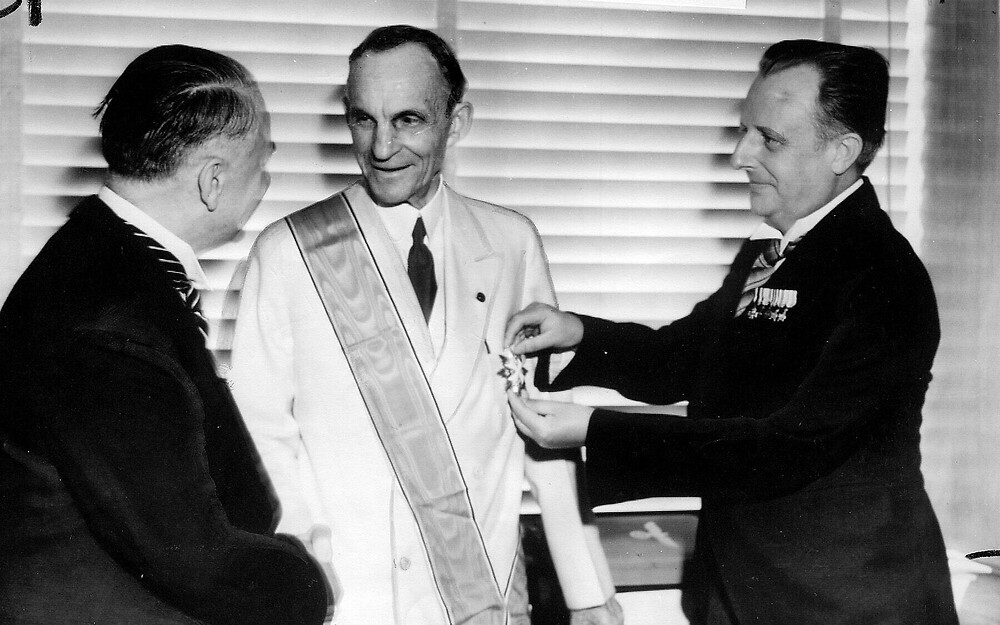A short note, mainly quoting a few references for those who ever wondered about why cars are so prominent, and why public transports or trains aren’t better developed.
Think of the amount of needless:
- deaths by accidents;
- direct and indirect pollution, and related health hazards;
- waste caused by “forced” car updates every few years or so;
- systematic noise pollution in every city;
- oil related conflicts;
- space and soil wasted for roads/motorways/parking;
- time spent driving;
- etc.

Henry Ford (center) receives the Grand Cross of the German Eagle, Germany’s highest decoration for foreigners, in July 1938 through timesofisrael.com – likely, available for fair use
The short answer is that major American automakers gain control over public transport via investments, and essentially dismantled it.
During the past five years, I have studied the social consequences of one of the most enduring monopolies of this century […]. My findings, contained in a study entitled American Ground Transport, are briefly this: the Big Three car companies [General Motors, Ford and Chrysler] used their vast economic power to restructure America into a land of big cars and diesel trucks.
I guess that because of America’s cultural influence, the model was structurally exported to the rest of the world; which is not contradictory with the existence of local lobbies. Some elements (in French) pertaining to France’s contemporary situation are evoked in this article from the EGE (“Economic de Guerre Économique”: Economical War School).
Naturally, by the same logic, one can but ponder about the influence of oil producers, and others actors.
Bradford Snell’s report also recall the peculiar ties of GM with the Nazis and Soviets:
GM is a major force in international affairs. During World War II, for instance, it maximized global profits by supplying both the Axis and Allied powers with armaments. Its auto plants in Germany built thousands of bomber and jet propulsion systems for the Luftwaffe at the same time that its American plants produced aircraft engines for the U.S. Army Air Corps. Currently, it is negotiating with the Soviet Union for the construction of the world’s largest truck facility.
The following excerpt from a 1998 Washington Post article illustrates this situation in greater details:
“[…] GM was an integral part of the German war effort. The Nazis could have invaded Poland and Russia without Switzerland [their banks in particular]. They could not have done so without GM.”
[…]
In certain instances, American managers of both GM and Ford went along with the conversion of their German plants to military production at a time when U.S. government documents show they were still resisting calls by the Roosevelt administration to step up military production in their plants at home.
[…]
When American GIs invaded Europe in June 1944, they did so in jeeps, trucks and tanks manufactured by the Big Three motor companies […]. It came as an unpleasant surprise to discover that the enemy was also driving trucks manufactured by Ford and Opel – a 100 percent GM-owned subsidiary – and flying Opel-built warplanes.
[…]
Army report by investigator Henry Schneider dated Sept. 5, 1945, accused the German branch of Ford of serving as “an arsenal of Nazism, at least for military vehicles” with the “consent” of the parent company in Dearborn.
[…]
Hitler was an admirer of American mass production techniques and an avid reader of the antisemitic tracts penned by Henry Ford. “I regard Henry Ford as my inspiration,” Hitler told a Detroit News reporter two years before becoming the German chancellor in 1933, explaining why he kept a life-size portrait of the American automaker next to his desk.
[…]
In July 1938, four months after the German annexation of Austria, he [Ford] accepted the highest medal that Nazi Germany could bestow on a foreigner, the Grand Cross of the German Eagle. The following month, a senior executive for General Motors, James Mooney, received a similar medal for his “distinguished service to the Reich.”
Michael Dobbs for the Washington Post, November 30, 1998 (local cache)
The average Westerner is probably convinced that Nazis are pure evil, but too often ignores how much we (the West) shaped the Nazis1, and how they have indirectly shaped us: Nazis are not a weird accident of history, they are well and deeply integrated with the rest of it.
Note: Related: I often wonder how much of the lack of generalists in favor of specialists, in research as well as in the industry, is the result of Fordism.
-
Recall for completeness that Joseph Goebbels, Nazis’s propagandist, was (most likely (fr, pdf)) influenced by Edward Bernays, American public relation/advertisement pioneer. Bernays is for example famous for – dare I say – « acting if favor gender equality by breaking unfair social constructs preventing women to smoke as freely as men. » Think of the millions (!) of deaths, broken families, essentially caused by a single man. ↩︎
Comments
By email, at mathieu.bivert chez: